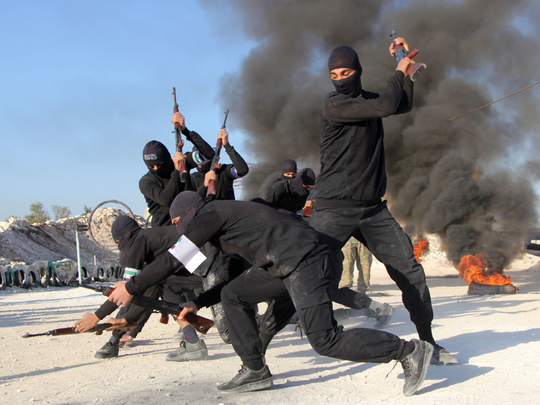
Of all the ways the world is likely to change in 2017, the destruction of the self-proclaimed ‘caliphate’ in northern Syria and Iraq is one we can anticipate with some confidence. The only downside to the welcome end to the territorial project of Daesh (the self-proclaimed Islamic State of Iraq and the Levant) is that it will most likely result in a dramatic upsurge in the group’s terror attacks in the Middle East and beyond. Daesh’s transformation from a state-building franchise to a global terrorist network is clearly evident in the New Year attacks in Istanbul and Baghdad, which can be related to the increasing pressure that Daesh is under to prevent its so-called caliphate’s collapse in Iraq and Syria.
In Iraq, a United States-led coalition is making encouraging headway in its attempts to liberate Mosul, the country’s second city, from Daesh control. In Syria, the recent rapprochement between Russia and Turkey has seen Daesh’s stronghold in Raqqa come under renewed pressure. It is now clear that Daesh’s leader, Abu Bakr Al Baghdadi, had ordered the Istanbul nightclub attack that killed 39 partygoers in the early hours of New Year’s Day, as well as the suicide car bombing in a busy square in Baghdad the following day, as a direct response to the setbacks Daesh has suffered around Mosul and Raqqa. The Baghdad suicide bombing, which took place in the Shiite stronghold of Sadr City, was designed to send a clear signal to the Shiite government of Prime Minister Haider Al Abadi that Daesh had no intention of ending their campaign to establish and maintain their fiefdom in Iraq.
The Reina nightclub massacre in Istanbul, on the other hand, was Daesh’s way of trying to persuade Turkish President Recep Tayyip Erdogan to end Turkey’s recent military campaign against Daesh strongholds in Syria. Erdogan, who has shown sympathies of his own in the past, has no one but himself to blame for the upsurge in Daesh attacks against Turkey during the past year, which have claimed hundreds of lives, as well as hurting the country’s important tourism industry.
During the early stages of the Syrian conflict, Erdogan, a committed opponent of Syrian President Bashar Al Assad, was accused of providing tacit support to Daesh, allowing militants to smuggle arms across the Turkish border to their Syrian strongholds. But fears that Daesh’s dominance of northern Syria would enable Kurdish separatists to expand their efforts to create an independent state on the Turkish border obliged Erdogan to make a U-turn and close down the Daesh supply routes.
The result has been a wave of devastating Daesh terror attacks, including last June’s attack on Istanbul’s Ataturk airport. The concern now is that, with the military campaign to destroy Daesh’s headquarters in Mosul and Raqqa set to intensify this year, the organisation will respond by carrying out even more outrageous attacks, including against western targets. The warning by Britain’s Security Minister Ben Wallace last week that Daesh was plotting a mass casualty attack against Britain using chemical weapons showed the scale of the challenge that lay ahead. Daesh has already demonstrated its willingness to use such weapons; intelligence officials believe it has carried out chemical attacks against civilian targets in Syria.
And as Daesh has — to quote Wallace — “no moral barrier” to using chemical weapons against civilian targets, destroying Daesh’s terrorist infrastructure, as well as its territorial strongholds, should be our top priority this year. Otherwise, there will be further atrocities on the scale of Paris, Nice, Berlin, Istanbul and all the other locations around the world that have suffered at the hands of this barbarous movement. United States President-elect Donald Trump’s impending arrival at the White House certainly presents an opportunity to form a global consensus on defeating Daesh, just as it had happened in the aftermath of the September 11 attacks on America in 2001, when world leaders agreed almost unanimously on destroying the Al Qaida leadership.
During the eight years US President Barack Obama, attempts to formulate a common policy have often been undermined by wrangles between Moscow and Washington over the fate of the Al Assad regime in Damascus, as well as the outgoing president’s disinclination to involve America. But now that Russia has succeeded in its objective of saving Al Assad, Trump has an opportunity to test Russian President Vladimir Putin’s claim that his ultimate goal has been the destruction of Daesh. For, if the Russian leader is serious about destroying the modern curse of terrorism, and not just playing puerile mind games with the West, then there is no reason why 2017 should not only lead to the liberation of Daesh’s territorial strongholds, but also curtail its ability to terrorise the civilised world.
— The Telegraph Group Limited, London, 2017
Con Coughlin is the Telegraph’s defence editor and chief foreign affairs columnist









